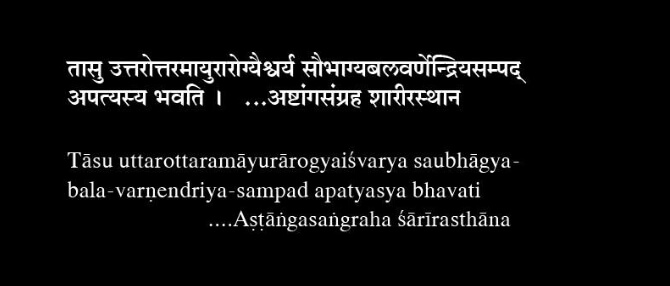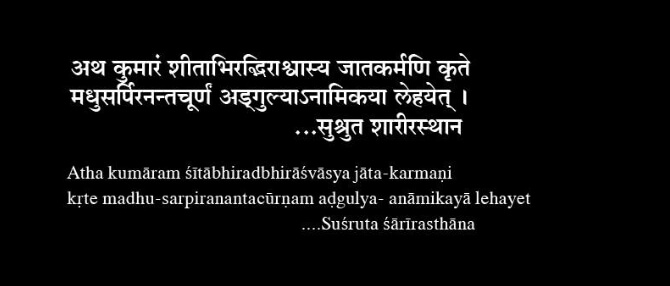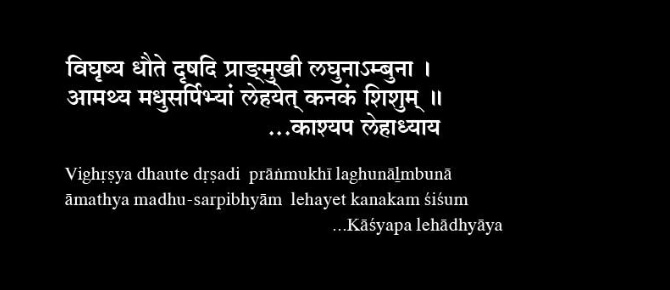THE GIFT OF GARBHADHAAN
Ayurveda and other ancient Indian sciences talk about the concept of the ‘Sixteen Sanskars’ to be performed during one’s life. These rituals are designed to help the person achieve success, longevity and prosperity. Garbhadhaan is the first of these, performed for a person by one’s parents. While Garbhadhaan includes conceiving the child, it is actually much more than just conception. When a man and woman come together with the intention of producing a well-balanced, virtuous and healthy child, and imbibe the values and practices that go along with the process, it is called Garbhadhaan. The suggestions made in this book about preparing for conception are all part of Garbhadhaan. The intentions of the parents and virtues imparted to the child are taken care of in the manner described below.
Before the actual Garbhadhaan, the couple should observe celibacy for one month. This conserves their shukra dhatu and fosters the production of healthy sperm and ovum. As mentioned earlier, fertilization occurs if the sperm and ovum meet in rutukaal. To conceive a strong and healthy child with the best qualities, the ideal time for sexual intercourse is a few days after menstruation, or to be more exact, from the eighth day after the onset of menstruation (counting the first appearance of bleeding as day one), up to the 15th night. During this time-span, it is best to choose days as late before the 16th night as possible. The reasons for this are as follows:

The later the ovum is fertilized, the better the chances are that the child will be healthy and prosperous, have good fortune, strength, a good complexion, and strong sense organs. Conversely, the later the ovum is fertilized after the 16th night of the cycle, the lower are the chances of such qualities flowering in the child.
Just before conception, i.e. sexual intercourse, the couple should not be thirsty, hungry, nor should they have eaten too much of food, or food that is heavy to digest. It is recommended that they have a meal of sattvik food, which is satisfying and good for their constitutions. The partners should have mutual respect and love for each other, as well as a genuine desire to produce a child together.
They should be free of feelings such as anxiety, mourning, sadness, anger, and exasperation. In addition to all the above, thoughts and acts that increase vata (late nights, thoughts that cause stress etc.), should be avoided. If they are not avoided, there could be problems during fertilization, and if conception does occur, it could result in miscarriage, moodhgarbha (the foetus taking an inappropriate position in the womb), or other damage to the foetus.
HONEY AND GOLD
The following Sanskar is one of the important procedures advised by Ayurveda. It is completely safe and should be done as soon as possible after the baby is born.


Place a drop of honey and ghee (just honey is also fine) onto a sahan (a grindstone made from a particular material). Take a piece of pure gold (24 karat – not something that is part of or taken from everyday jewelry) and grind it in a coin-sized clockwise circle on the honey on the stone. The person grinding the gold should be facing east while doing so. Gently rub this mixture on to the baby’s tongue, with the right hand ring finger.
This should be done daily for six months. According to Kashyap Samhita, this mixture has the following benefits
- increases the baby’s lifespan
- improves the immune system
- increases intellect and memory
- protects the baby from negative energies
- it can help make the child so intelligent that he or she will be able to remember things that have been only heard once.
OIL THE BABY
After this, ghee or gentle oil infused with vata- pacifying herbs, such as Santulan Abhyang coconut oil, should be applied very gently all over the baby’s skin. This facilitates the easy removal of the sticky mucus-like substance that covers the skin of the newborn; if necessary, a little black salt (saindhav) may be added to the oil to aid the removal of the mucus. When this is done, the child should be bathed with clean, warm water.
Ayurveda advises the use of sarvagandhodaka for the baby’s bath. Boil water with the following herbs – cinnamon, bay leaf, cardamom, cloves, camphor, nagkeshar (Mesua ferrea), kankol (Cubeba officinalis), agaru (Aquilaria agallocha), shilajeet (Asphaltum) – and let the water cool until lukewarm and use it to bathe the baby. To make things easier, a decoction made from the above- mentioned herbs may be added to warm bath water instead. This decoction is not only fragrant, but it pacifies vata as well.

